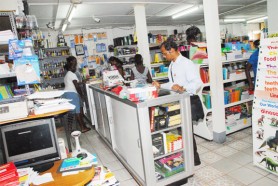Says piracy has made the sale of original texts ‘risky business’
Austin’s Bookstore, the city’s leading bookseller, has told Stabroek Business that it has had to cut the importation of textbooks by up to 70 per cent as a result of the competition from pirated copies. Lloyd Austin, the bookstore’s proprietor, told this newspaper that his store is now down to importing “a few dozen copies” of texts from several reputable publishers as against “a few hundreds” in previous years. He says he has had to slash importation of books published by Oxford, Nelson-Thorne, Heinemann and Longman as well as two regional publishing houses, Royards and Caribbean Education Publishers. He told Stabroek Business that all of these were key publishers of books used in the local school curriculum.

Legitimate importers and overseas publishers have, for years, been battling the multi-million dollar pirating of textbooks which allows for copies of texts to be sold at considerably lower prices. Protests to the authorities regarding the underlying infringement of intellectual property and copyright legislation have been met with a posture of official evasiveness.
Stabroek Business understands that a local attorney-at-law has been retained to pursue legal action against entities printing and marketing the illegal texts. This newspaper has been told, however, that evidence against the perpetrators has been difficult to come by. When asked to comment on the matter Austin said that as far as he was aware some evidence had been acquired and that court proceedings may commence in the relatively near future. Copied texts are sold by a number of prominent urban retail businesses and are popular with parents on account of the fact that they cost less than published originals.
Meanwhile, Austin told Stabroek Business that the proliferation of copied texts had made the marketing of published texts a particularly risky business. “Textbooks are a high risk business. There is the ever present danger that they might be left on the shelves. My arrangement with publishers is one that facilitates credit but at the end of the day the books must be paid for whether you sell them or not.” Austin said that while his establishment still persisted with textbook importation it had shifted its focus to “general books.”
The bookstore proprietor repeated his concern that the Ministry of Education may at least have some knowledge of the illegal printing of textbooks. Education Minister Shaik Baksh has reportedly agreed to ‘find out’ about the charge that his Ministry might be in league with the pirates. A school source told this newspaper earlier this week that some schools had already begun receiving bulk copies of copied texts from the Ministry’s Book Distribution Unit for distribution in schools.
Meanwhile, Austin told Stabroek Business that local educational institutions, including the University of Guyana, would have only themselves to blame if they experience a shortage of textbooks over the next academic year. “Every year when we ask these learning institutions they tell us that they are not yet ready with their book lists. Obviously, we cannot wait on them forever,” He said.





